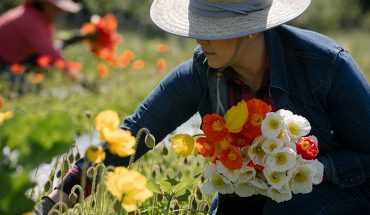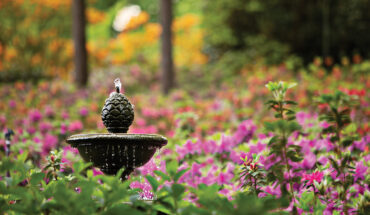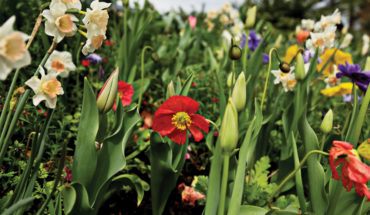Al and Suzy Newsom turned a revelation about peat moss into a fast-growing brand.
Written by Matt Lail
Photography by Geoff Wood
A glance around Al and Suzy Newsom’s home reveals an appreciation for life, for growth. Vivacious tropical plants pay homage to her Brazilian upbringing and showcase his passion for horticulture. Now, that shared passion is a thriving business.
Al Newsom has been in this area’s gardening world for years. He studied horticulture at N.C. State, ran his own landscape company for 16 years and owned The City Gardener store, first in Cameron Village and then in Ridgewood Shopping Center. After selling those companies in 1999, he went to work with Ball Seed Company, where he works to this day, traveling the world consulting about plant varieties. “It’s a dream job.”
But a decade ago, frustrated with commercial potting mixes, Al Newsom started creating his own. And on a trip to a peat moss farm in Canada with Ball Seed seven years ago he had a revelation.
Deep inside the peat moss bogs are sticks, vegetation that was pushed into the bogs by glaciers thousands of years ago. “They become like petrified wood,” Al Newsom explains. Typically, when peat is harvested for potting soil, those sticks are removed (often, they’re used to build roads across the bogs). But Al Newsom saw the potential for more. “I was so intrigued. I knew there was some magical use for the stuff.”
He wondered if those same sticks couldn’t be processed into a fiber to create a soil mix with a structure that allowed more air flow. “I realized that the main issue with soil mixes was that they broke down too quickly, making the mixes too dense,” he says. “The reason those mixes break down quickly is because the main component is pine bark.” Al Newsom went to work on a new mix, made with bog sticks, that would offer a better balance of air space and water retention. “Roots need air just as much as they need water, which leads to better root growth and formation.” Working with a small team, Al Newsom developed a recipe made from the bog stick fibers into something strong and useful: BogBits.
With the magic ingredient in hand, Al and Suzy Newsom had a decision to make. At the time, Suzy Newsom, who had worked in medical sales before taking time off to raise their daughter, was considering going back to school for her master’s. Instead, she dove into the dirt.
“I said, ‘I think we can make dirt sexy,’” remembers Suzy Newsom. Combining their talents—he had the horticulture bit, she studied international business and marketing at Georgetown—the couple decided to go for it. The result was Good Dirt, a line of potting mixes (built on the foundation of BogBits), soil conditioners and all-natural plant foods that are pesticide-free and sustainably produced. “With Good Dirt, we create products so gardeners of all skill levels can make the most of their soil and plants,” says Suzy Newsom.
The bulk of Good Dirt’s growth has been, well, organic—and also rapid. The first orders were small, fulfilled from their dining room table. But the customers were loyal, and the orders got bigger, increasing from just a few bags to shipping by the truckload and growing their team in new headquarters at Loading Dock Raleigh—all within three years.
The Newsoms attribute that growth to being authentic and true to their mission. “Our passion comes through,” says Al Newsom. “Gardening is our therapy; it’s our lifestyle.” The product, packaging (hand-illustrated by Seattle artist Sarah Simon) and sustainability story drew the notice of social media influencers who shared the Good Dirt story. Their ethos—simple, successful, sustainable—also connected with chic urban plant stores around the country, like Stump in Philadelphia, Folia Collective in Los Angeles, Pistils Nursery in Portland, and My City Plants in New York City. Curated plant stores “create an experience,” says Al Newsom. “They’re the hottest brick-and-mortar garden lifestyle shops,” his wife adds. Good Dirt is approaching some 200 such accounts in just a year and a half.
Two years ago, Philip Freeman, founder and CEO of Murphy’s Naturals, put the Newsoms in contact with Target. They sent a sample of the product to Freeman’s buyer representative in St. Paul; the rep immediately drove to Target headquarters in Minneapolis. As the story goes, it took about 30 seconds for Target to decide to carry Good Dirt in its stores. Being in this high-profile chain “provides credibility and brand exposure like you wouldn’t believe,” says Suzy Newsom, “and it created a snowball effect to be able to reinvest in the company and create new products.”
Being rooted in Raleigh has also resulted in collaborations with companies in their “ecosystem” through Good Dirt Garden Services. Current clients include the revamped Gateway Plaza shopping center, The Longleaf Hotel and Trophy Tap + Table, where Good Dirt installed sustainable rooftop planters in September (almost six months later, the plants are thriving—and they haven’t even been watered since installation).
“Suzy and Al are in business for the right reasons—to make the planet a greener and cleaner place,” says Trophy co-owner David Meeker. “We needed to have someone we could trust to handle our greenery and landscaping projects the right way. With Suzy and Al, you have the trust.”
Henry Ward, a partner with LODEN Properties, the firm behind Gateway Plaza and The Longleaf Hotel, says Good Dirt Garden Services projects have become “templates” for other ventures moving forward. “Al and Suzy pursue a unique approach to landscape design that is a fantastic complement to our goal of transformative urban redevelopment,” says Henry Ward. “Good Dirt’s installation strategy is highly attuned to using native plants that will have longevity in our climate and can be sustainably maintained. Their design aesthetic is very unique, and we love all of the compliments that we receive from our visitors about their work.”
Today, Good Dirt can be found in garden centers and stores all over the country, not to mention every one of the 1,750-plus Target stores in the United States. “Even Hawaii,” Al Newsom proudly adds. Locally, some early Good Dirt believers include Logan’s Trading Company, Homewood Nursery, Myatt Landscaping, The Zen Succulent and Raleigh City Farm, which has conducted trials with the products from the beginning. “Just the other day I looked at some raised beds we did at Raleigh City Farm three years ago. I just started grinning,” says Al Newsom. “It looks like we just opened the bag. It hasn’t broken down. Good Dirt has proven itself.”






